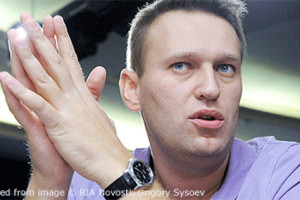Following Supreme Court Presidium’s verdict Navalny regains right to be elected until new trial concludes

MOSCOW. Nov 16 (Interfax) – The Russian Supreme Court Presidium’s decision to reverse the sentence in the Kirovles case against opposition activist Alexei Navalny and businessman Pyotr Ofitserov restored Navalny’s right to stand for election.
“Alexei has a right to participate in elections at any level right now,” Navalny’s spokesperson Kira Yarmysh told Interfax on Wednesday.
However, if a guilty verdict is passed repeatedly, Navalny will be deprived of this right again.
“But the Supreme Court sent the case to a court of first instance again and this means that he may be deprived of the right to stand for election under a new sentence,” Yarmysh said.
Navalny’s lawyer Olga Mikhailova, in turn, said that it was the sentence in the Kirovles case that prevented the opposition activist from running for election, “because this verdict had been passed under an article for a grave crime.”
“Charges in the Yves Rocher case against Alexei and Oleg Navalny were re-classified under the Article 159.4 of the Russian Criminal Code, in other words, an article not for a grave crime, thus he is able to stand for election now,” Mikhailova said.
As reported, on Wednesday, the Russian Supreme Court reversed the sentence of Navalny and Ofitserov and sent the case for a new trial to the court of first instance, Kirov’s Leninsky District Court.
The defendants and their defense team do not agree with this judgment and said that they intend to file a claim with the Committee of Ministers of the Council of Europe, which monitors enforcement of decisions of the European Court of Human Rights (ECHR). They said that the Supreme Court Presidium virtually refused to fulfill the ECHR decision.
On July 18, 2013, Kirov’s Leninsky District Court sentenced Navalny to five years in prison and Ofitserov to four years in prison on charges of embezzlement from the Kirovles enterprise. Both of them were taken into custody in the courtroom but were freed the next day with travel restrictions until the moment the sentence took legal effect. The Kirov Regional Court later overturned the Leninsky District Court’s judgment and gave both defendants suspended sentences and a fine of 500,000 rubles.
On February 23, 2016, the ECHR ruled that Russian courts had found Navalny and Ofitserov “guilty of acts indistinguishable from regular commercial activities. In other words, criminal law had been arbitrarily construed to the applicants’ detriment.”
The ECHR ordered Russia to pay Navalny and Ofitserov in aggregate over 80,000 euros in compensation for damage caused to them.
Russia contested the ECHR’s judgment in the Kirovles case in late May. The Russian Justice Ministry said that appeal contested the conclusions of the ECHR’s chamber made in the judgment of February 23, 2016 “on the merits of the defendants’ complaints against violation of their right to a fair trial, as well as on the decision to award fair compensation.”
On July 5, the ECHR rejected Russia’s request to send the Kirovles case to the Grand Chamber in accordance with the decision to order payment of compensation to Navalny and Ofitserov. Thus, the ECHR’s decision on the case took legal effect, and the case was sent to the Russian Supreme Court to be considered alongside the ECHR ruling.
